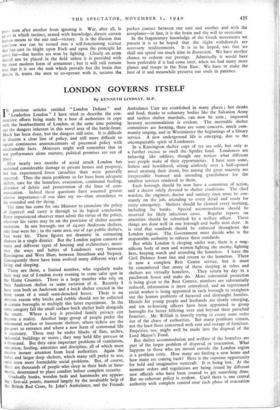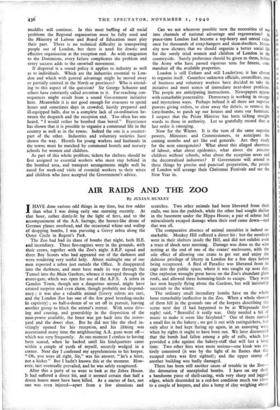LONDON GOVERNS ITSELF
By KENNETH LINDSAY, M.P.
IN previous articles entitled " London Defiant " and " Leaderless London " I have tried to describe the con- structive efforts being made by a host of authorities to cope with the bombardment of London, at the same time pointing out the dangers inherent in this novel area of the battle-front.
Much has been done, but the dangers still exist. It is difficult to discern a clear line of policy, and still more difficult to square continuous announcements of pieceineal policy with ascertainable facts. Ministers might well remember that in war performance alone matters; political promises are out of place.
After nearly two months of aerial attack London has sustained considerable damage to private homes and property, but has experienced fewer casualties than were generally expected. Thus the main problems so far have been adequate shelter, care for the homeless, evacuation, communal feeding, clearance of debris and preservation of the lines of com- munication. Indeed these questions have assumed greater relative importance—if one dare say so—than attendance to the wounded and the dying.
The time has come for one Minister to enunciate the policy of dispersal and carry it through to its logical conclusion. Every experienced observer must admit the virtue of the policy, whatever his views may be on the provision of shelter accom- modation. In one borough, out of 24,000 Anderson shelters, only four were hit ; in the same area, out of 240 public shelters, four were hit. These figures are dramatic in estimating chances in a single district. But the London region consists of many and different types of housing and architecture; more- over the ways and habits of Londoners vary between Kensington and West Ham, between Streatham and Stepney. Consequently there have been evolved many different ways of living and sleeping.
There are those, a limited number, who regularly make their way out of London every evening to some safer spot in the Home Counties. There is a large number who rely on their Anderson shelter or some variation of it. Recently 1 have seen both an Anderson and a brick shelter erected in the front room of a small semi-detached house. There is no obvious reason why bricks and rubble should not be collected in certain boroughs to multiply this latter experiment. In the same category fall the small surface brick shelter built alongside the street. Where a key is provided family privacy can become a reality. Another large group of people prefer the communal surface or basement shelters, where tickets are the passport to entrance and where a new form of communal life Is necessary. These may be under blocks of flats, arches, industrial buildings or stores ; they may hold fifty persons or a thousand. But they raise important problems of ventilation, sanitation, feeding, amenities and discipline, all of which must receive instant attention from local authorities. Again the tubes and larger deep shelters, which many still prefer to use, raise even more formidable social problems. But, of course, there are thousands of people who sleep in their beds or base- ments, determined to place comfort before complete security.
Gradually bunks, wooden beds and hammocks are appear- ing first-aid points, manned largely by the invaluable help of the British Red Cross, St. John's Ambulance, and the Friends Ambulance Unit are established in many places ; hot drinks and food, thanks to voluntary bodies like the Salvation Army and tireless shelter marshals, can now be seen ; improved lavatory accommodation is evident. The inevitable shelter committees are forming, there are some concerts, much com- munity singing, and in Westminster the beginnings of a library service. A new underground life is emerging, due to the unconquerable spirit of Londoners.
In a Kensington shelter cups of tea are sold, but only as a further excuse to swell the Spitfire fund. Londoners are behaving like soldiers, though one notices what different uses people make of their opportunities. I have seen some, listless and bewildered, sitting aimlessly over a half-opened novel awaiting their doom, but among the great majority are irrepressible humour and unending gratefulness for the smallest services rendered to them.
Each borough should by now have a committee of action, and a doctor solely devoted to shelter conditions. The chief warden, the engineer, doctor and sanitary men must be con- stantly on the job, attending to every detail and ready for every emergency. Shelters should be cleaned every morning, including the bunks. Special accommodation should be reserved for likely infectious cases. Regular reports on amenities should be submitted by a welfare officer. These things are done well in one borough and badly next door. It is vital that standards should be enforced throughout the London region. The Government must decide who is the responsible authority to enforce these standards.
But while London is sleeping under war, there is a mag- nificent body of men and women fighting the enemy, fighting fires, keeping watch and attending the homeless. I leave the Civil Defence front line and return to the homeless. There is now a complete Rest Centre service, but it must be remembered that many of those sleeping in tubes and shelters are virtually homeless. They return by day to a patchwork house and make do. More substantial protection is being given to the Rest Centres, numbers are substantially reduced, information is more centralised, and an experienced social worker is being appointed in each borough to straighten out the human problems of harassed and distraught families. Hostels for young people and husbands are slowly emerging, and ten re-housing officers have been appointed to group boroughs for better billeting over and beyond their parochial frontiers. Mr. Willink is bravely trying to create some order out of the chaos of authorities. But many problems remain, not the least those concerned with rent and storage of furniture. Enquiries, too, might well be made into the disposal of the Lord Mayor's Fund.
But shelter accommodation and welfare of the homeless are part of the larger problem of dispersal or evacuation. What happens to those who are moved outside the London region is a problem story. How many are finding a new home and how many are coming back? Here is the supreme opportunity for bold and imaginative statecraft. It is being lost. At the moment orders and regulations are being issued by different new officials who have been created to get something done. But no coherent policy is evident. Until there is one central authority with complete control over each phase of evacuation muddles will continue. In this most baffling of all social problems the Regional organisation must be fully used and the Ministry of Labour and Board of Education must play their part. There is no technical difficulty in transporting people out of London, but there is need for drastic and effective organisation at the reception end. As with emigration to the Dominions, every failure complicates the problem and every success adds to the snowball movement.
If dispersal is a sound policy it applies to industry as well as to individuals. Which are the industries essential to Lon- don and which with general advantage might be moved away or partially centred in the North or provinces? Who is attend- ing to this aspect of the question? Sir George Schuster and others have constantly called attention to it. Far-reaching con- sequences might result from a sound Government initiative here. Meanwhile it is not good enough for evacuees to spend hours and sometimes days in crowded, hastily prepared and ill-equipped halls, due to a complete lack of co-ordination be- tween the despatch and the reception end. Too often has one heard, " I would rather be bombed than bored." Experience has shown that it is possible to organise a communal life in the country as well as in the towns. Indeed the one is a counter- part of the other. Industries and voluntary societies have shown the way. Hostels for young workers and husbands in the towns must be matched by communal hostels and nursery schools for women and children.
As part of this whole problem, tickets for shelters should be first assigned to essential workers who must stay behind in the bombed area, and transport arrangements might well be eased for week-end visits of essential workers to their wives and children who have accepted the Government's advice. Can we not wherever possible turn the necessities of war into channels of national advantage and regeneration? hi peace-time London had become a top-heavy and unreal exist. ence for thousands of strap-hangers and slum-dwellers. Neces- sity now dictates that we should organize a better social life for the sorely tried women and children of London in the countryside. Surely preference should be given to them, before the Army who have passed vigorous tests for fitness, com. mandeer all the available properties.
London is still Defiant and still Leaderless; it has chosen to organise itself. Countless unknown officials, councillors, men of business and voluntary workers have decided to take the initiative and meet scores of immediate next-door problems. The people are anticipating instructions. Newspapers appear with remarkable punctuality. Democracy is working in strange and mysterious ways. Perhaps behind it all there are superior powers giving orders, to clear away the debris, to remo ie the time-bombs, to patch up our houses and store our furniture. I suspect that the Prime Minister has been talking straight words to those in authority. Let us gratefully record that at last order is emerging.
Now for the Winter. It is the turn of the same superior powers, Ministers and Commissioners, to anticipate the coming months and act like real generals. Are they ready for the next emergencies? What about this alleged shortness of labour, what about epidemics, what about the 200,000 children without schools, what about the reception areas and the decentralised industries? If Government will attend to these things by precise and punctual preparation, the people of London will arrange their Christmas Festivals and see the New Year in.







































 Previous page
Previous page